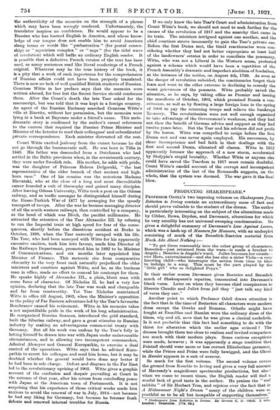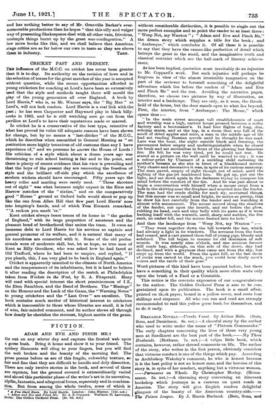PRODUCING SF ATCPSPEARE.* PROFESSOR OD 's two imposing volumes on
Shakespeare from Betterton to Irving contain an extraordinary mass of fact and should prove valuable to the student of the drama. The author
is particularly interesting on the subject of the alterations made by Gibber, Rowe, Dryden, and Davenant, alterations for which
he very sensibly has not universal sweeping condemnation. He gives a delightful summary of Davenant's Law Against Lovers, which waa-a hash-up of. Measure for Measure, with an underplot consisting of much of the Benedick-Beatrice material from Much Ado About Nothing :— " To get them reasonably into the other group of characters, Benedick—just returned from the wars—is made a brother to Angelo ; Beatrice is Angela's ward. Juliet becomes her cousin— vice Hero, exterminated—and she has also a sister Viola—a very knowing child—who interrupts the action from time to time to indulge in a song. This must be the part played by the ' little girl ' who so delighted Pepys."
In their earlier scenes Davenant gives Beatrice and Benedick much of Shakespeare's repartee, transmuted into Davenant's blank verse. Later on when they become chief conspirators to liberate Claudio and Juliet from jail they " just talk any kind of verse they can."
Another point to which Professor Odell draws attention is the fact that in the time of Betterton all characters wore modern dress except the Greeks and Romans. Othello might have fought at Ramillies and Hamlet wore the ordinary dress of the times, wig and all, save that he was given a clerical neckcloth. Is it not probable that this fact had something to do with the thirst for alteration which the earlier ages evinced ? The dresses brought them too close to realism and invited comparison too much with their modern plays. Some curious exceptions were made, however ; it was apparently a stage tradition that Falstaff should wear more or less correct Pli7abethan garments, while the Prince and Poins were fully bewigged, and the Ghost
in Hamlet appears in w suit of armour.
So much for the first volume. The second volume covers the ground from Kemble to Irving and gives a very full account of Macready's magnificent spectacular productions, but alas ! when we come to recent times, the English reader will find a
woeful lack of good taste in the author. He praises the " real rabbits " of Sir Herbert Tree, and rejoices over the fact that in A Midsummer Night's Dream " many of the children were so youthful as to be all but incapable of supporting themselves," • Shakespeare from Betterton to /masa. By Goorao 0. 1). Odell. 2 vols. London : OonstabLe. 17Th. &LI
and has nothing better to say of Mr. Granville Barker's ever- memorable productions than he hopes " that this silly and vulgar way of presenting Shakespeare died with all other vain, frivolous, unsimple things burnt up by the great war-conflagration." A few more books like this, and we shall believe that American stage critics are as far below our own in taste as they are above



































 Previous page
Previous page